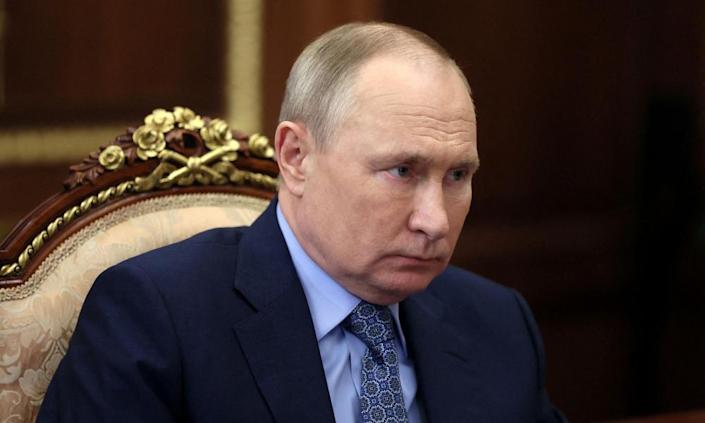Joe Biden has called for the prosecution of Vladimir Putin for war crimes after the discovery in Bucha, Ukraine, of mass graves and bodies of bound civilians shot at close range. But bringing the Russian president to trial would be far from simple.
What are war crimes?
The international criminal court (ICC), the world’s first permanent war crimes tribunal, defines them as “grave breaches” of the Geneva Conventions, a set of humanitarian laws to be observed in war.
Jonathan Hafetz, an international criminal law and national security scholar at Seton Hall University School of Law, told the Reuters news agency that the execution of civilians as alleged in Bucha was a “quintessential war crime”.
Russia continues to deny culpability. Its defence ministry insisted on Sunday that “not a single civilian has faced any violent action by the Russian military”.
How can a case pointing to war crimes be built?
Jake Sullivan, the US national security adviser, told reporters on Monday that there were four main sources of evidence: information gathered by the US and its allies including from intelligence sources; Ukraine’s own efforts on the ground to develop the case and document forensics from the killings; material from international organisations including the UN and NGOs; and findings by global independent media with photos, interviews and documentation.
Related: ‘Leave no stone unturned’: how investigators gather evidence of war crimes in Ukraine
Can Putin be held personally responsible for his troops’ actions?
The prosecution could argue that Putin and his inner circle committed a war crime by directly ordering an illegal attack or knew crimes were being committed and failed to prevent them. This case may be hard to prove in isolation but if it fits a wider pattern across Ukraine, it becomes more compelling. The US had accused Russia of war crimes even before Bucha.
Philippe Sands, a professor at University College London, told the Associated Press: “You’ve got to prove that they knew or they could have known or should have known. There’s a real risk you end up with trials of mid-level people in three years and the main people responsible for this horror – Putin, Lavrov, the minister of defence, the intelligence folks, the military folks and the financiers who are supporting it – will get off the hook.”
Who would run such a trial?
The ICC opened 20 years ago to prosecute the perpetrators of genocide and crimes against humanity. But the US, China, Russia and Ukraine are not members of the court, which has been criticised for focusing too heavily on Africa and applying “selective justice”.
The ICC’s chief prosecutor, Karim Khan, said in February he had opened a war crimes investigation in response to Russia’s invasion of Ukraine. Although it is not a signatory, Ukraine previously approved an investigation dating back to 2013, which includes Russia’s annexation of Crimea.
The ICC will issue arrest warrants if prosecutors can show “reasonable grounds” to believe war crimes were committed. But there is little chance that Russia would comply and the ICC cannot try someone in absentia. The US’s unwillingness to join the court is also diplomatically awkward and likely to prompt cries of western hypocrisy.
Donald Trump once told the UN general assembly: “As far as America is concerned, the ICC has no jurisdiction, no legitimacy, and no authority.” His administration announced that the US would impose visa bans on ICC officials involved in the court’s potential investigation of Americans for alleged crimes in Afghanistan.
But Sullivan said on Monday: “The US has in the past been able to collaborate with the international criminal court in other contexts despite not being a signatory. But there’s a variety of reasons one might consider alternative venues as well.”
What are these “alternative venues”?
The UN seems an obvious starting point. But one problem with going through the UN security council is that Russia is a permanent member. “It would be difficult to imagine that they would not attempt to exercise their veto to block something,” Sullivan observed.
Related: ‘It’s a slam dunk’: Philippe Sands on the case against Putin for the crime of aggression
Another option might be a special tribunal organised by a group of countries. The Nuremberg tribunal was established by the US, Britain, France and the Soviet Union to hold Nazi leaders to account after the second world war.
Potential models for Ukraine could include the tribunals set up to prosecute war crimes committed during the Balkan wars in the early 1990s and the 1994 Rwanda genocide. Another example was the UN-backed special court for Sierra Leone, established in 2002 to bring to justice those responsible for atrocities perpetrated during the country’s country’s civil war in 1996.
What about a different charge?
It would be easier to prosecute Putin for the crime of aggression after he waged an unprovoked war against another sovereign country. The ICC does not have jurisdiction over Russia for the crime of aggression because Russia is not a signatory.
Last month dozens of prominent lawyers and politicians, including the Ukrainian foreign minister, Dmytro Kuleba, and the former British prime minister Gordon Brown, launched a campaign to create a special tribunal to try Russia for the crime of aggression in Ukraine.
How long would a prosecution take?
Probably many years. The international criminal tribunal for the former Yugoslavia indicted its first head of state, the then Yugoslav president, Slobodan Milošević, in 1999 and took him into custody in 2001. His trial began in 2002 and was under way when he died at the Hague in 2006.
Charles Taylor, the former president of Liberia, was found guilty of aiding and abetting war crimes and crimes against humanity for supporting rebels who carried out atrocities after four years of hearings at the special court for Sierra Leone in the Hague.




